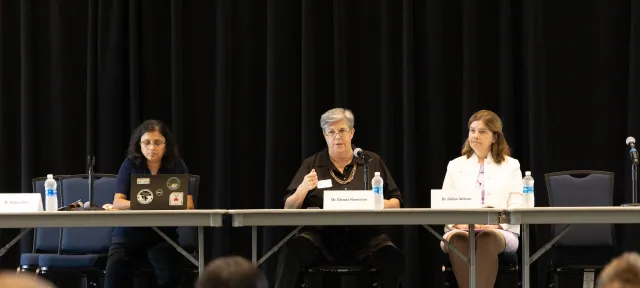
By Srabani Das and Sara Rosenberg
The University of California Agriculture and Natural Resources-UC Merced Symposium ‘Regenerative Agriculture: The way forward’ on July 1 brought together stakeholders to showcase regenerative agriculture in the San Joaquin Valley. The symposium was an opportunity for participants to learn about successful ongoing work and target future objectives while considering possible implementation challenges, like bottlenecks.
The day-long workshop offered three credits of Certified Crop Adviser continuing education units towards nutrient management, soil and water management, integrated pest management, crop management, professional development and sustainability.
More than 100 people attended, including subject experts, growers, students, researchers, technical advisors, nonprofit and industry representatives, in addition to UC Cooperative Extension personnel.
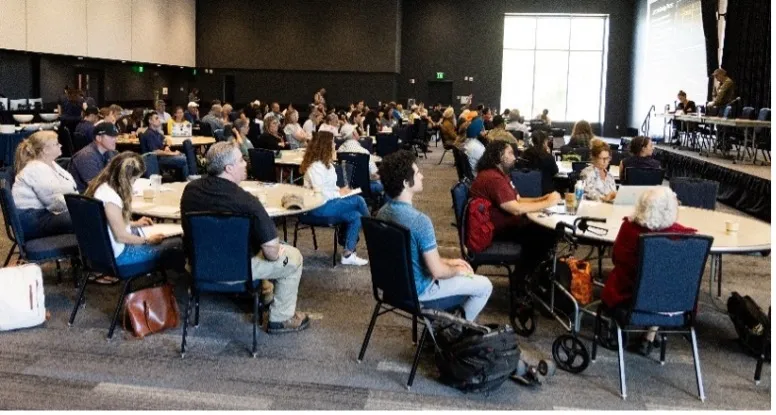
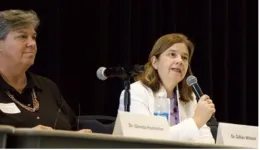
Gillian Wilson, vice chancellor for research, innovation and economic development at UC Merced, welcomed the attendees and expressed happiness at the event, which showcased the UC Merced-UC ANR Cooperative Extension collaboration for supporting agriculture. She highlighted UC Merced as a new Agricultural Experiment Station campus, which means the school is taking on expanded responsibilities to fulfill the University of California land-grant mission of serving the community, like strengthening agriculture in the San Joaquin Valley. The partnership is funding faculty, embedding UC Cooperative Extension specialists on campus and helping build long-term capacity for applied, community-connected research.
Delivering the special guest remarks, Glenda Humiston, UC vice president for agriculture and natural resources, shared her excitement about the workshop and elaborated on Cooperative Extension’s commitment to this area of work over the years, through programs such as the Sustainable Agriculture Research & Education Program (SAREP), Small Farms Network, and Organic Agriculture Institute, which partner with other organizations and have recently hired regenerative agriculture academics.
As regenerative agriculture advocates chart their course in a burgeoning field, they build on previous decades of work on biologically integrated orchard systems and organic agriculture. To successfully elevate regenerative agriculture to the next transdisciplinary level, they are developing technologies, sustainable supply chains, and access to markets, while educating the public and regulators in partnership with institutions, including the private sector and all kinds of farms – large and small.
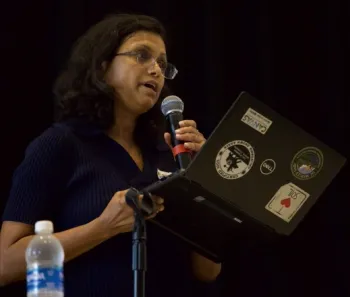
Srabani Das, assistant Cooperative Extension specialist and professor in regenerative agriculture at UC Merced, noted that regenerative agriculture is not new, saying, “Indigenous communities and different cultures across the world have farmed in harmony with nature for centuries and reverting to a land stewardship approach to agriculture will help restore Mother Earth and sustain economies.” She quoted the California Department of Food and Agriculture’s definition of regenerative agriculture for its policy and programs “as an integrated approach to farming and ranching rooted in principles of soil health, biodiversity and ecosystem resiliency leading to improved targeted outcome.” She added that field-days, pilot studies, human stories, long-term relationships with growers, University-level education, training and extension are crucial.
Session 1: Research updates
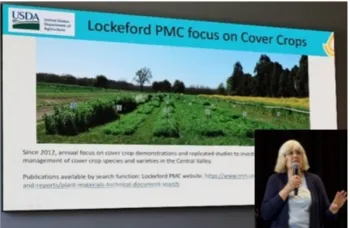
The experts from the morning session were introduced by Vivian Wauters of SAREP. Margaret Smither-Kopperl, manager of USDA Natural Resources Conservation Service’s Lockeford Plant Materials Center, elaborated on the use of cover crops as a tool for regenerative agriculture, focusing on species selection options and site-specific cover cropping.
Amélie Gaudin, associate professor and Endowed Chair in Agroecology at UC Davis, highlighted research results from research on the potential of animal grazing to build soil health in almond and vineyard systems. Mike Titze, senior engineering geologist and hydrogeologist at Formation Environmental, LLC elucidated the Multi- benefit Land Repurposing Program (MLRP) and its application in the Turlock sub-basin Groundwater Sustainability Plan. MLRP outlines strategies to address decreased groundwater allocation from Sustainable Groundwater Management Act implementation.
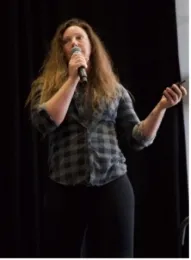
Sara Rosenberg, UCCE regenerative agriculture advisor for Merced, Mariposa and Stanislaus counties, discussed results from an ongoing needs assessment highlighting interviews from growers and extension workers in the San Joaquin Valley. She shared that three regenerative agriculture listening sessions were already organized by UCCE in the San Joaquin Valley during the previous months. Das shared survey study results from UC ANR academics.
Session 2: Farmers share their experiences
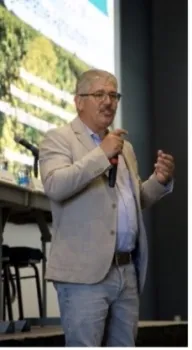
The second session was kicked off by Joshua Viers, UC Merced associate vice chancellor for interdisciplinary research and strategic initiatives, who introduced a panel of San Joaquin Valley farmers and spoke about UC Merced and AES faculty engagement in regenerative agriculture research and education.
Second-generation rancher and entrepreneur Rizpah Bellard shared her experience of regenerative ranching and raising grass-fed beef in Fresno. Rosie Burroughs, the matriarch of the Burroughs Family Farm, Denair (the only producers of regenerative organic certified almonds in California), spoke about the links between regenerative agriculture, health and biodiversity. She stated that “biodiversity is balance, balance is harmony, and when there is balance you don't have a pest problem.”
Another speaker, Joe L. Del Bosque is a farmer in Firebaugh who has served on the California Water Commission. He grows asparagus, almonds and cherries, as well as organic melons and tomatoes. He shared that his family has implemented reduced till, pollinator-friendly hedgerows and efficient irrigation systems for years. “Most importantly,” Del Bosque added, “we are willing to change and are good employers,” stressing the social side of agriculture.
Almond farmer Amrik Singh Basra recounted his own agricultural journey in the San Joaquin Valley. After migrating from Punjab, India, he began growing almonds in Madera County and advocating for agricultural water allocation. Gary Martin, the fourth-generation farmer of Pikalok Farming in Firebaugh and chairman of the California Cotton Growers and Ginners Association, described his regenerative practices. He grows conventional cotton with minimum tillage, rotates with irrigated wheat and alfalfa, along with almonds and pistachios. For decades, he has produced gin trash-poultry manure, but increasing poultry prices have led him to switch to cover crops.
Arshdeep Singh, a small-scale citrus grower from Fresno, president of the Punjabi American Growers Group, and member of CDFA’s BIPOC Advisory Committee, is a strong advocate for small-scale family farming. While praising CDFA’s Healthy Soils Program in advancing regenerative agriculture, he pointed out that infrastructure around the program creates roadblocks at times, exemplified by compost application amounts and costs. He emphasized that growers often have little trust in researchers, as many do not have any farming experience and university research can be disconnected from farm realities. Also, as many farmers are non-English speakers, there is a huge barrier between them and government policies and university research. Farmers, including small-scale ones, will be open to rolling with research as long they understand and trust it, Singh said.
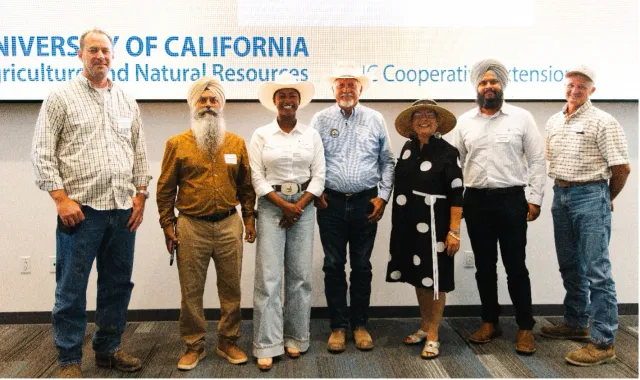
John Warmerdam of Kings Orchards in Hanford is a conventional but regeneratively minded grower and packer of peaches, plums, nectarines, cherries and almonds. Warmerdam began his regenerative journey five years ago by using less chemicals, even though there is no premium for his fruits. He said he is passionate about "doing the right thing" and hopes for other conventional growers to know there is a place for them to farm better without the fear many may feel about going chemical-free.
The question-and-answer session sparked discussions on marketing regenerative produce, falling back on regenerative strategies to tide over low-market situations, farmers’ difficulties in borrowing money amid falling land prices, advantages and disadvantages of labelling, going local to help growers and connecting growers with buyers. The panel members agreed that regenerative agriculture needs more investments, improved markets, greater farmer profit margins, efficient water quantity and quality management strategies and more on-the-ground help for growers. Thus, researchers and extension workers have a huge role to play in shouldering regenerative agriculture progress in partnership with growers, emphasizing the need for more trained staff in the state.
Session 3: Irrigation,composting, IPM, grazing, climate adaption
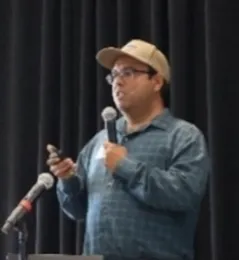
UC Merced graduate student Victoria De Leon introduced the speakers of the afternoon session. Paul Lum, senior agricultural specialist for American Farmland Trust, described efficient irrigation methods to guide on-farm water management to sustain plant productivity while avoiding over-irrigation. He shared his knowledge on available equipment, technology and funding sources to help improve irrigation scheduling and enhance water conservation.
Rebecca Ryals, associate professor of agroecology and Presidential Chair of Climate Change at UC Merced, spoke about the science and practice of community-scale composting and her work to create small, decentralized facilities in the San Joaquin Valley, which are important to divert organic waste from landfills, reduce air pollution and meet SB1383 objectives.
Sudan Gyawaly, UCCE IPM advisor for Butte, Colusa, Sutter-Yuba, Glenn and Tehama counties, spoke about IPM principles and sustainable pest management tools that support regenerative practices in perennial systems.
Julie Finzel, UCCE livestock and natural resources advisor for Kern, Tulare and Kings counties, delivered a presentation on sheep grazing in almond orchards. Her research aims to address food safety concerns due to potential fecal pathogen transfer to raw almonds during harvest.
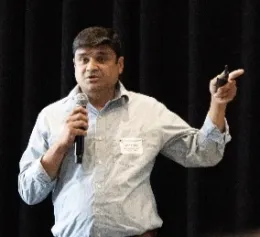
Tapan Pathak, associate Cooperative Extension specialist and professor of climate adaptation in agriculture at UC Merced, discussed existing trends in climate change and how they affect agriculture in California. He also provided tools and resources to manage agriculture under these risks.
Overall, the workshop was successful in engaging stakeholders, offering training, advancing the dialogue and ensuring we don’t create silos within the field of regenerative agriculture. We hope to transition California agriculture in its entirety to cope better with the pressures of drought, groundwater limits, soil degradation, and climate change.
A big thank you to the UC Merced and Farms, Food and Future (F3) initiative interns and employees – Noah Zemaryalai, Carlos Martinez, Christian Boyd, Alli Sweigard, Morelia Santana – and others for helping with pictures, notes, logistics and UC Merced Dining for serving a great lunch.

